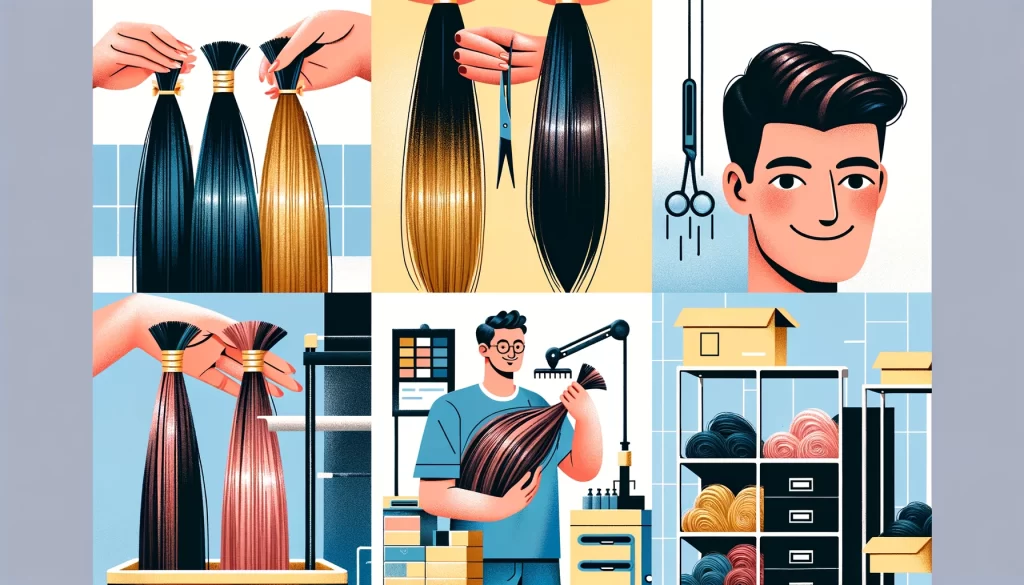Table of Contents
Can you donate dyed hair? This question has crossed the minds of many who want to give back through hair donation but worry that their colored locks might not be suitable. Hair donation is a generous act that helps provide wigs for people with hair loss, often due to medical conditions like cancer. However, if you love experimenting with hair colors, you might wonder if your dyed hair can still make a difference. This article will uncover the surprising truth about whether dyed hair is accepted for donation and what you need to know before cutting.
Can You Donate Dyed Hair? Understanding Hair Donation

Can You Donate Dyed Hair? Hair donation is a beautiful way to support individuals who have lost their hair due to illness or treatment. Organizations collect donated hair to create wigs, offering comfort and confidence to those in need. But before you decide to donate, it’s essential to understand the requirements and guidelines set by these organizations.
Can You Donate Dyed Hair? Who can donate hair?
Not everyone knows this, but there are specific criteria for hair donation. Most organizations require a minimum length of hair, typically around 8 to 12 inches, to ensure enough to work with when creating a wig. Additionally, the condition of the hair matters; it should be clean, healthy, and free from damage. But what about dyed hair? Let’s explore whether your colored strands meet the standards.
Can You Donate Dyed Hair?
So, can you donate dyed hair? The answer is both yes and no, depending on the organization. Some organizations accept dyed hair, while others have strict policies against it. Understanding these rules can save you time and help you find the right place to donate.
Organizations That Accept Dyed Hair
Can You Donate Dyed Hair? Several organizations understand that many people love to dye their hair and are still willing to accept it. They recognize that if adequately cared for, dyed hair can be as valuable as untreated hair. However, they often have specific requirements regarding the type and condition of dyed hair.
For example, Locks of Love is one organization that accepts dyed hair as long as it’s in good condition. They avoid accepting hair that is overly processed or bleached, as it tends to break easily. Similarly, Wigs for Kids accepts dyed hair but requires it to be free of chemical damage.
Organizations That Don’t Accept Dyed Hair
Can You Donate Dyed Hair? On the other hand, some organizations are more stringent about the hair they accept. For instance, Pantene Beautiful Lengths has historically only accepted untreated, natural hair, as it’s easier to process into wigs. They believe that untreated hair lasts longer and provides a more natural look.
If you frequently dye your hair and want to donate, you must check the specific guidelines of the organization you’re considering. This way, you can be sure your donation will be used effectively.
How to Prepare Dyed Hair for Donation

If you’ve decided to donate your dyed hair, it’s essential to prepare it properly. Following these steps ensures that your hair is in the best possible condition for donation.
Maintain Healthy Hair
Can You Donate Dyed Hair? The healthier your hair, the more likely it will be accepted for donation. To keep your dyed hair healthy, use sulfate-free shampoos and conditioners for colored hair. As much as possible, stay away from heat-styling tools as they might be damaging. Regular trims can help prevent split ends, keeping your hair strong and ready for donation.
Follow the cutting-edge guidelines
When you’re ready to donate, follow the organization’s cutting-edge guidelines. Typically, you must gather your hair into a ponytail or braid before cutting it off. This keeps the hair together and makes it easier to donate. Cut above the elastic band to ensure the hair stays secure.
Package and Send Your Hair
After cutting your hair, carefully package it according to the organization’s instructions. Some places require hair to be dry before sending, while others might have specific packaging guidelines. Once your hair is securely packaged, please send it to the organization, and rest easy knowing you’ve made a difference.
Alternatives to Donating Dyed Hair
Don’t be discouraged if your dyed hair doesn’t meet the donation requirements. There are other ways to contribute to causes that provide wigs to those in need.
Financial Donations
If you cannot donate your hair, consider contributing financially to hair donation organizations. These donations help cover the costs of creating and distributing wigs, ensuring that even more people benefit from the kindness of donors.
Also Read: How Many Wisdom Teeth Can You Have? Surprising Truth Revealed!
Spread Awareness
Raising awareness about hair donation is another great way to contribute. Share information on social media, host fundraising events or encourage friends and family to donate their hair. By spreading the word, you can increase the number of donations and make a more significant impact.
Volunteer Your Time
Can You Donate Dyed Hair? Many hair donation organizations rely on volunteers to help with various tasks, from processing hair donations to organizing fundraising events. If you have the time and passion, volunteering can be a meaningful way to get involved and support these organizations.
So, can you donate dyed hair? The surprising truth is that you can, in many cases, as long as your hair meets certain conditions. By understanding the guidelines of different organizations, maintaining healthy hair, and properly preparing it for donation, you can contribute to a cause that brings joy and confidence to those who need it most. If donating your dyed hair isn’t an option, remember there are still plenty of ways to make a difference. Whether through financial support, raising awareness, or volunteering, your efforts can help provide wigs and support to individuals facing hair loss. Ultimately, it’s not just about the hair—it’s about the impact you make by giving back.



